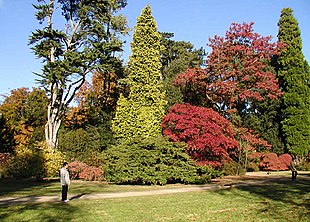
Back Arboretum Afrikaans Arboretum ALS مشجر Arabic Dendrari Azerbaijani Дэндрарый Byelorussian Дендрариум Bulgarian Arborètum Catalan Arboretum Czech Arboret Danish Arboretum German

An arboretum (pl.: arboreta) is a botanical collection composed exclusively of trees and shrubs of a variety of species. Originally mostly created as a section in a larger garden or park for specimens of mostly non-local species, many modern arboreta are in botanical gardens as living collections of woody plants and are intended at least in part for scientific study.
In Latin, an arboretum is a place planted with trees, not necessarily in this specific sense, and "arboretum" as an English word is first recorded used by John Claudius Loudon in 1833 in The Gardener's Magazine, but the concept was already long-established by then.[1]

An arboretum specializing in growing conifers is known as a pinetum. Other specialist arboreta include saliceta (willows), populeta (poplar), and querceta (oaks). Related collections include a fruticetum, from the Latin frutex, meaning shrub, much more often a shrubbery, and a viticetum (from the Latin vitis, meaning vine, referring in particular to a grape vine). A palm house is a large greenhouse for palms and other tender trees.